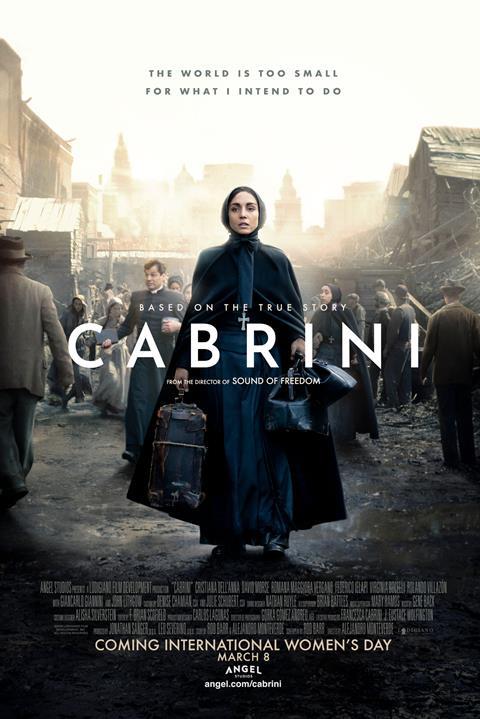Cabrini (2024) directed by Alejandro Monteverde and starring Cristiana Dell’Anna, John Lithgow and David Morse tells the true story of Italian immigrant Frances Cabrini, a Catholic missionary who persuaded a hostile mayor to provide housing and healthcare for hundreds of orphaned children living in the slums of New York City in 1889. Sue Gray gives her review of the story of America’s first saint.
Cabrini chronicles the true story of Frances Xavier Cabrini, a pioneering nun from Italy who dedicated her life to serving the marginalised and underserved communities of the United States. Directed by acclaimed filmmaker Alejandro Gómez Monteverde, the film offers a poignant and inspiring portrayal of Cabrini’s ability to uplift the lives of immigrants and establish a legacy of compassion and service.

Her vision: to build an empire of hope and to pioneer missions in China, establishing orphanages in the forgotten East. After seeking approval and guidance from Pope Leo XIII, he urged her to go “not to the East, but to the West” to help Italian immigrants who were flooding the USA, mostly in great poverty.
Throughout the movie Cabrini (portrayed by Cristiana Dell’Anna) shares thought provoking quotes, leaving you challenged to your core. Apparently, some of the dialogue was taken from historical record. One such exchange is from the Vatican scene.
The Cardinal says: “There has never been an independent Order of missionary women!”
Cabrini replies: “Mary Magdalen brought news of the Resurrection to the Apostles. If the Lord confided that mission to a woman, why should he not confide in us?!”
Cabrini replies: “Mary Magdalen brought news of the Resurrection to the Apostles. If the Lord confided that mission to a woman, why should he not confide in us?!”
Although her response elicited a few giggles from the audience, as a viewer you come to realise that Cabrini was a force to be reckoned with, a woman of courage in her calling, depth in her faith who had great ambition.
One must remember that she came face to face with sexism and anti-Italian bigotry, in a world dominated by men. She had to persistently battle her way into spaces where women were unwelcome, continually forging a space for her voice to be heard.
We know that if you want to go far, you go together. Mother Cabrini along with six sisters arrive in New York City in 1889. But it’s not a soft landing, they soon encounter disappointment and difficulties.
We know that if you want to go far, you go together. Mother Cabrini along with six sisters arrive in New York City in 1889. But it’s not a soft landing, they soon encounter disappointment and difficulties.
On their first night in America, Cabrini and her sisters walk through the Five Points section of New York, a desperate, often violent slum in lower Manhattan, where she reminds them to ‘open your eyes, see everything, these are the people we have come to serve.’
The following day Cabrini has a key encounter with Archbishop Corrigan, played by the wonderful David Morse. The Archbishop strongly suggests she gets on a boat and returns to Italy. He forbids Cabrini from soliciting money from Americans.
This made it difficult – if not impossible – for Cabrini to fund her mission. She’s undeterred by this interaction, and perhaps filled with more determination and resolve to transform the lives of Italian immigrants everywhere and to take her empire of hope worldwide, establishing schools and orphanages despite tremendous odds.
Read more film reviews
‘So, last week I met Jesus’ (a review of The Chosen Season 4)
Mrs. Harris Goes to Paris is a sweet film with some very Christian values
The film Belfast includes a damning portrayal of the Church but there are plenty of positives too
I highly recommend watching Cabrini. The film offers a powerful depiction of Cabrini’s dedication to her faith and her tireless efforts to challenge societal norms and advocate for those in need. Through her journey, viewers are invited to reflect on themes such as resilience, compassion, and the pursuit of justice. It is a compelling cinematic experience that celebrates the indomitable spirit of one woman’s quest to make a difference in the world.



































1 Reader's comment